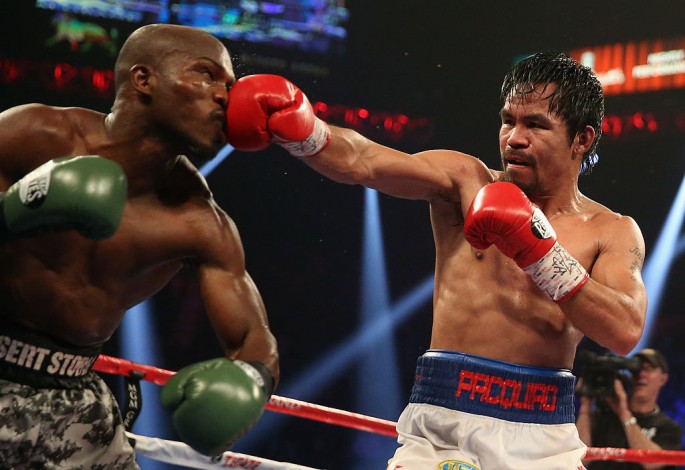In a recent report by Joaquin Henson of the Philippine Star, boxing's only eight division world champion and Filipino ring icon Manny "Pacman" Pacquiao had been invited to the upcoming 2016 Summer Olympics which takes place in Rio de Janeiro, Brazil on August 5.
AIBA President Dr. Ching Kuo Wu is said to have agreed to allowing Pacquiao to skirt the qualifiers and proceed directly to competition, in light of recent movements to allow professional boxers to compete in the Olympics.
"We want the best boxers to come to the Olympics," said Wu. "It is AIBA's 70th birthday and we want something to change, not after four years but now. It is an IOC policy to have the best athletes in the Games and of the international federations, AIBA is probably the only one without professional athletes in the Olympics."
The idea is grand, but there is a slight complication -- boxing is a combat sport. This isn't basketball, this is the hurt business. In boxing, athletes get hurt and they get hurt often.
To allow professional athletes to compete in boxing at the Olympics will completely change the game.
Unlike amateur fighters who are concerned with scoring points, pro boxers are accustomed to dealing in damage and will look to stop their opponents instead of outpoint them. This will obviously not line up in a pro boxer's best interests if and when they resume their professional careers.
Furthermore, pro boxers are accustomed to fighting a mere two to three times in a year. This is so because of the brutal nature of boxing as a full contact sport where lacerations and injuries are common, and fighters require ample time to heal.
In the Olympics, fighters compete in multiple bouts over a short period of time, significantly reducing recovery time in between bouts.
More so, dangerous mismatches could take place because not all professional boxers will likely take part in the Olympic games.
Imagine Pacquiao, who has faced the biggest names in the sport for the past 21 years, obliterating opponents at times with ease, going up against an unknown 19-year old. Hard to stomach, isn't it?
If your name isn't Manny, it won't end well for you.
Yes, pro boxers competing in the Olympics could tone down their approach and look to focus more on technique rather than on power, but then what would be the point?
Power is a key element of boxing and is what makes the sport compelling. You could have all the technique in the world, but power is a game changer.
If Pacquiao were to take Dr. Wu's offer, he'd have to compete between the light welterweight (64 kilogram limit or 141 pounds) and the welterweight (69 kilogram limit or 152 pounds) divisions, most likely closer to the latter.
His biggest opponents are still the usual suspects and won't differ much from a professional standpoint, except for the fact that boxing in the Olympics is usually only a three-round affair. Imagine getting to see Pacquiao finally face the United States' Terence Crawford in a measly three-rounder -- not that great really.
While having professional boxers compete at the Olympics is a bold move, there are just too many factors to consider before it should be made a reality. There's a reason why it isn't a thing yet, and right now, the negatives far outweigh the positives.



























